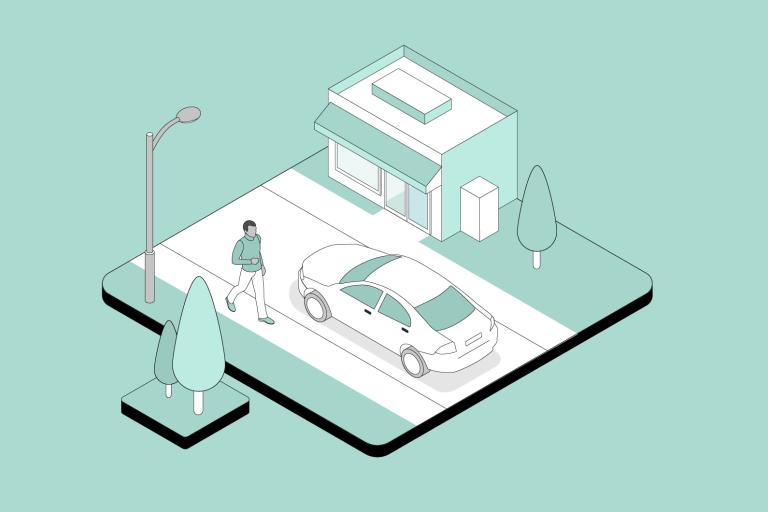Footways and cycle tracks
Guidance on accommodating footways and cycle tracks, and how to design them.
Access control barriers
Access control infrastructure should only be used to address a safety issue or prevent illegal motor vehicle access. It should not limit access for people walking, wheeling and cycling.
Bridges
Bridges can overcome major barriers on desire lines.
Coloured surfacing
Coloured surfacing can help users identify cycle lanes and tracks. It is not a legal requirement to use coloured surfacing for cycle lanes and tracks, but it can be useful for active travel routes if used correctly.
Cycle tracks and cycle lanes
Protected cycle tracks offer segregated space to create inclusive cycling conditions. Cycle lanes are spaces reserved for cycling on the carriageway.
Gradients
Steep gradients on walking, wheeling and cycling routes can discourage people from using them and, in some cases, exclude them altogether.
Pavements and footpaths
Pavements should provide a safe, comfortable and accessible space for people walking and wheeling.
Play facilities
Play facilities have an important role in creating attractive, social, and inclusive spaces.
Public rights of way (PRoW)
Public rights of way form important networks of traffic-free, active travel routes.
Shared use
Shared use routes should generally be avoided but there are some contexts where they are appropriate, if well-designed and implemented.
Surface materials
Choosing appropriate surface materials will ensure that a development will be functionable, attractive and will last over time.
Tactile paving
Tactile paving enables blind and vision impaired people to navigate safely around the public realm.
Underpasses
Underpasses, where they are necessary, can overcome barriers formed by large busy highways and railways.
Junctions, crossings and access
Guidance on providing for walking, wheeling, and cycling movements across side streets, from one side of the street, at the junctions of streets or to access buildings.
Building access
Building access should be convenient, step-free, and barrier-free. Cycle parking should be secure.
Crossings
Safe and accessible crossings provide direct and convenient connections between local cycling and walking networks.
Side road crossings
Advice on how footways and cycleways can cross side-roads.
Safety, amenities and placemaking
Guidance on features and amenities that ensure active places are safe, well-used, functional, and attractive.
Benches and resting points
Benches and resting points along walking, wheeling and cycling routes should offer diverse seating options to accommodate various needs.
Cycle parking in the public realm
Cycle parking in streets and public spaces enables short stays at shops and community facilities.
Green and blue infrastructure
Green and blue infrastructure has many benefits for people and nature. This includes green and blue features such as parks, greenways, waterways, street trees and nature-based solutions to drainage.
Lighting
Lighting plays a crucial role in helping people find their way and provides a sense of security.
Secure cycle parking and off-street car parking
Cycle and car parking should be considered at the start of a development proposal, as part of a wider transport strategy.
Natural surveillance
Buildings and local activity can provide natural surveillance for walking, wheeling and cycling routes.
Shelter points
Shelter points invite communities to dwell, socialise and enjoy their surroundings.
Signage and wayfinding
Routes for pedestrians and cyclists should be well signed and easy to follow.
Streets
Guidance on street design and how walking, wheeling, and cycling can be accommodated alongside public transport and motorised traffic.
Bus stops
Bus stops should be placed at regular intervals to promote the use of public transport and multi modal journeys.
Charge points
Charging points for electric vehicles and electric cycles need to be planned and designed as part of the overall streetscape.
Cycle and scooter hire schemes
Planning for cycle and scooter hire schemes in new developments.
Designing for lower traffic speeds
Designing streets and zones with a maximum speed limit of 20mph can enhance safety for pedestrians, wheelchair users and cyclists.
Maintenance
Maintaining and managing routes is important to minimise hazards and obstructions.
On-street car parking
On-street car parking must be designed carefully to ensure it does not impact on visual quality and experience of pedestrians and cyclists.
Roads (width, speed and accommodating cycling)
Advice on the width of roads in developments and when cycling with no segregation is appropriate.
Shared space
Shared space, including mews streets, can be used to provide access to a small number of properties.
Traffic calming
Traffic calming measures should sit sensitively in the street scene.
Transport hubs
Good connectivity between walking, wheeling and cycling routes and public transport makes it easier for people to continue their journeys.
Guidance on how to plan and design active places at a site-wide level



